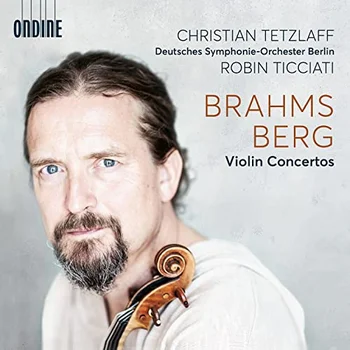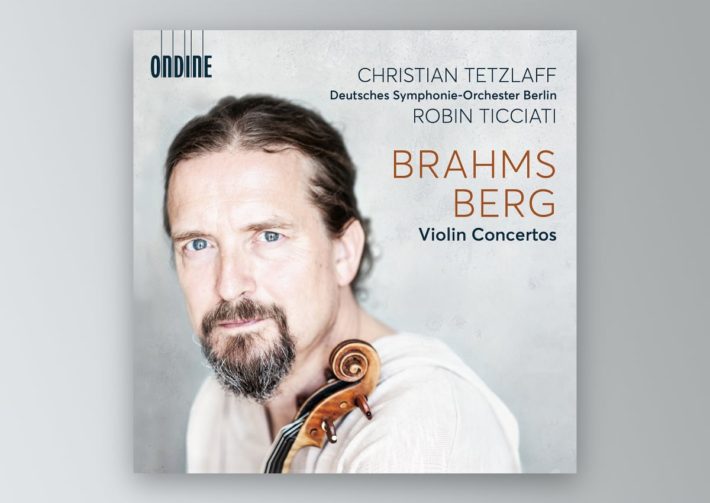Christian Tetzlaff continues to revisit concertos recorded earlier in his career. In 2019 these same performers released an album of the Beethoven and Sibelius concertos, even though Tetzlaff’s earlier performances are readily available. Nevertheless, the newer recording received significant critical acclaim. This latest album splits the difference: the Brahms competes with his earlier recording accompanied by the Danish National Symphony Orchestra and Thomas Dausgaard (Erato), but this is the first time he has recorded Berg’s concerto.

Several critics remarked on the chemistry between Tetzlaff and Ticciati in their first recording. The same is true here: Ticciati is a wonderfully accomplished accompanist, following and supporting every aspect of Tetzlaff’s interpretation. There is palpable energy to the orchestral sound, whether live (Brahms) or in studio (Berg), surely an indication that the DSO Berlin is inspired by, and invested in, Tetzlaff’s vision. Their ripened middle-European timbre outshines the Danish NSO in Tetzlaff’s earlier Brahms, and in the Berg their playing has an impressive combination of technical finesse and deep emotion.
Tetzlaff’s first Brahms recording is muscular but emotionally cool. His new reading is over two minutes faster and has greater ardor and emotional investment. Every technical hurdle (and there are many in this work) are easily met – bowing is more varied, phrasing more individual, and he relishes the works lyrical moments. From the opening measure of the opening movement there is a potent sense of atmosphere and Tetzlaff seems intent of extracting maximum emotional contrast from every phrase. The music’s forward momentum never wavers and how beautifully Ticciati and his orchestra establish the sense of contentment at 12’55”.
The second movement’s opening is bathed in gorgeous autumnal colors, the oboe solo effusive yet vulnerable. Tetzlaff and the orchestra carefully build towards the first impassioned outburst (3’30”), leading to a deeper sense of struggle and distress. The energetic playing of the final movement highlights the music’s Hungarian flavor, the final coda reaching an almost reckless but thrilling elation.
The Berg is perhaps even finer. In his linter notes Tetzlaff spends a significant amount of space explaining that the work has less to do with Manon Gropius and more to do with Berg’s hidden love for Hanna Fuchs and his daughter Albine, whom he had fathered when he was only seventeen. In short, he details the work’s complex emotional journey, and his performance unerringly charts that journey. Against an orchestral backdrop of richly burnished Romantic coloring, Tetzlaff’s violin is by turn forlorn, sensuous, fragile, and furious. His thoughtful phrasing, varying of vibrato and tonal weight, draws the listener into an emotional rollercoaster. The second part’s opening, the fierce lower brass answered by a howl of pain from the orchestra, steadily works its way to a particularly touching rendition of Bach’s “Es ist genug” chorale. Harmonia Mundi’s 2012 recording with Isabelle Faust, Orchestra Mozart and Claudio Abbado has long been my primary recommendation for this work, but Tetzlaff’s has the same devastating expressive power.
Ondine’s excellent recording is an ideal balance of warmth and transparency. Tetzlaff’s articulate notes lay out his interpretative ideas about the music and its interpretation. The same coupling is found on an Erato recording with violinist Renaud Capucon, the Vienna Philharmonic and Daniel Harding. The playing is similarly distinguished, though there are times in both works where soloist and conductor wallow in the sheer beauty of the sound at the expense of the work’s structure. The magnetism of this new album makes for an especially compelling listen – we can only hope for more recordings from this team.
Recommended Comparisons
Jansen | Mutter | Heifetz | Shaham
Brahms and Berg – Violin Concertos
Christian Tetzlaff – Violin
Deutsches Symphonie-Orchester Berlin
Robin Ticciati – Conductor
Ondine, CD ODE1410-2



















